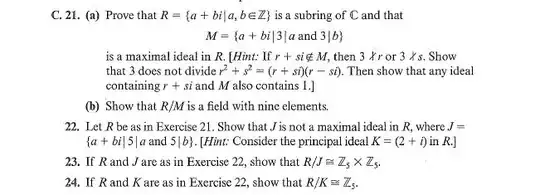 I have a quick question about the allowed function use to show isomorphism between quotient rings. The question assumes the following exercise:
I have a quick question about the allowed function use to show isomorphism between quotient rings. The question assumes the following exercise:
Let $R=\{a+bi|a,b\in \mathbb{Z}\}$, and $J=\{a+bi| 5|a, 5|b\}.$ Show that $J$ is not a maximal ideal in $R$ (Hint: Consider the principal ideal $K=\{a+bi\}$ in $R$)
The question asks:
If $R$ and $J$ are as in Exercise 1, show that $R/J \cong \mathbb{Z_{5}}$
I know that we can define $\psi: R\rightarrow \mathbb{Z_{5}}$ by $\psi(a+bi)=[a-2b]_{5}$, but can I use the function $\psi(a+bi)=[a+2b]_{5}$ instead?
Note: it is question 24 in the attached picture which assumes notations from exercises 21(a) and 22.
Thank you in advance.